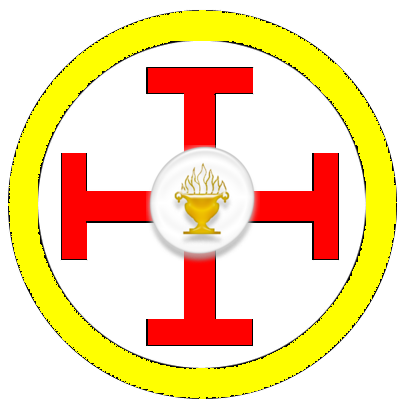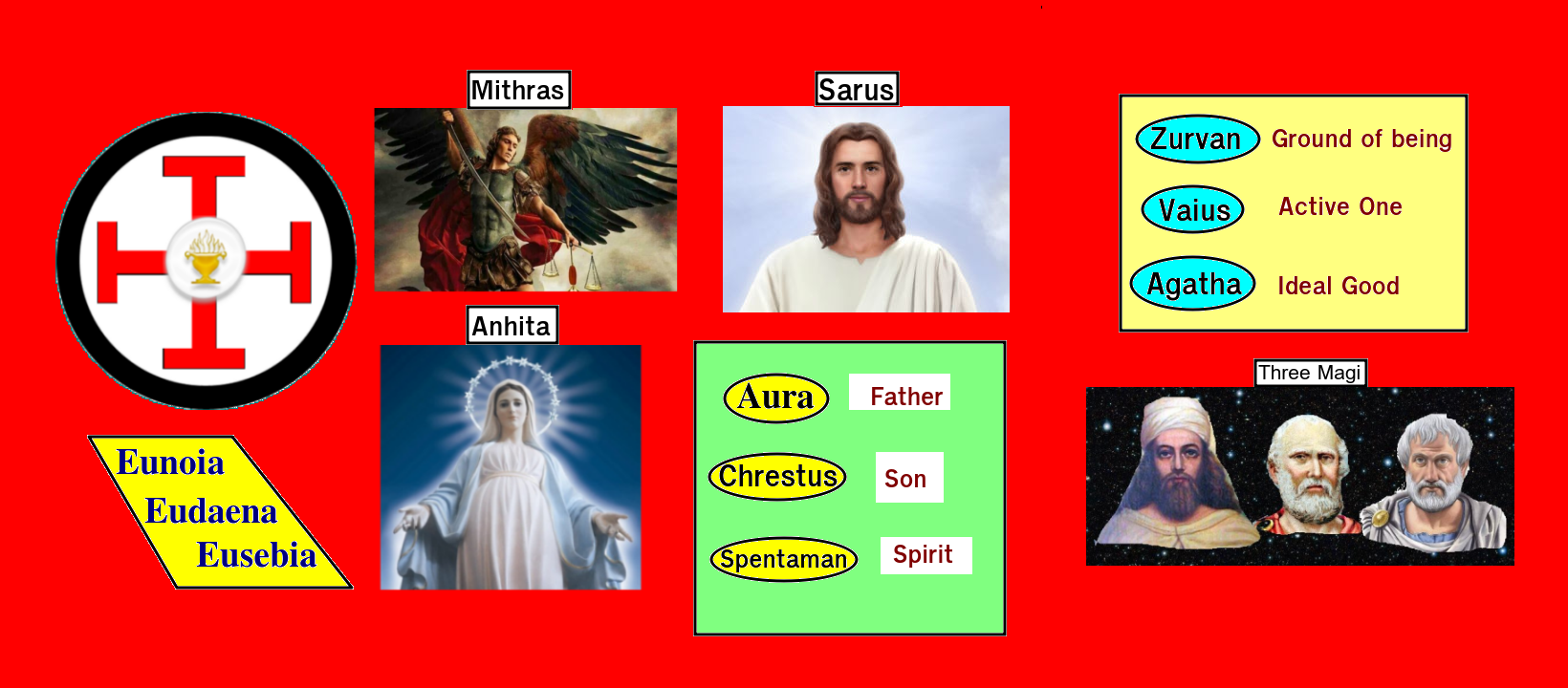 |
Fighting for the cause of the Good
|
 |
Fighting for the cause of the Good
|
BasicsDeus MagnusDeus Magnus or the Great God is the ultimate focus of our worship.God is by definition that which is most worthy of being attended to. What is most worthy of being attended to is that which is the source of our existence in all its various manifestations. God desires what is Good, which we know because Good and Bad have been built into the fabric of existence as Pleasure and Pain. Nobody who has experienced the extremes of Pleasure and Pain can doubt that former is better than the latter in an absolute sense. It is God who has set this distinction into reality and motivated us to seek one and avoid the other. TheorunaZorochristians recognise Existential Secrets or constituent elements of existence called the Anghoruna. Seven of these are considered 'elements of God' and are called the Theoruna. Some of these are:ZurvanZurvan is the Ground of Being in Time and Space.Zurvan represents the reality of the Universe with its good and bad aspects.It is the Foundation of Time and Activity which underlies all things. Zurvan is the Foundation of existence, the substrate of space and time in which all activity happens. UrvanUrvan is the Soul.i) Urvan acts on the world and continually shapes the progress of the world. ii) Urvan is sensitive and has experience which can be good or bad. iii) Urvan retains memory of its experience and can grow and develop over time. AgathonAgathon - The Good - is pure goodness whether as an abstract idea, an active presence or a passive experience. Agatha is not easily understood in her totality, but we can make an attempt by understanding her children the Agathoi.Agathon is the Ideal Good which Urvan reaches up towards like reaching towards the sun. Agathon is the particular configuration or kind of happening in Zurvan that is the best for life. Agathon is also known as the Beautiful for she is the most desireable of all. However she is not easily attained directly and to know and serve her better one should get to know her children - the Agathoi. KakonKakon - The Bad - is pure badness whether as an abstract idea, an active presence or a passive experience.The eternal drama of existence sees Urvan continually striving for Agathon and seeking union with Her. However there are all sorts of obstacles and impediments to this happening and Urvan is continually frustrated and suffering as a consequence. AgathoiThe Agathoi are the Good Beings.They are more abstract and consistently good than the Tropoi. Many are derived from traditional Zoroastrian teaching.The Agathoi are those beings recognised as being close to Agathon the Good or of partaking of her nature. We consider them her children with Vaius. Among the Agathoi are Auramazda (Wise Lord), Chrestus (Good One), Spentaman (Life-promoting spirit), Eunoia (Good Thinking), Artista (Best Order) and Eudemonia (Happiness). Artista (or Arta Thalica) is the (Ideal) Righteous Order or Righteous Progression of the world - a process where the actions of each fit harmoniously with the actions of others and the pre-existing nature of things. We believe it is the key requirement for a world which is congenial to life. KakoiThe Kakoi are the Bad Beings. Each of the Agathoi has a Kakus as an opponent.ChrestoprosopaThe Chrestoprosopa are personalities of Chrestus-Aristus, considered as trinity:Sarus is the listener who is sensitive to the souls of all creatures and thus provides guidance as to the best moral path of action. Anhita is the divine mother who provides growing life with nutrition and shelter adapted to their needs. Mithras is the righteous leader and guarantor of social order. TrimagiThe Trimagi or Three Magi are three wise men whose intellectual work is considered the most worthy of attention. They are regarded as the foremost teachers of Agathon. The trimagi are Zoroaster, Plato and Aristotle.RunesRunes are more abstract concepts we pay attention to. They are the same as the Agathist runes.DolusDolus is deception, trickery, fakery. Dolus is the biggest obstacle that prevents Vaius uniting with Agatha. A big part of the work of Zorochristians is to overcome Dolus so as to think straight with the clear mind of Eunoia.ScripturesOur primary scripture is the Gospel of Zoroaster also known as the Zartigathas or Songs of Zoroaster. We also value the traditional Avestan scriptures of the Persians and the philosophical writings of the ancient Greeks especially those of Plato and Aristotle. We also value the Jesus scriptures of the New Testament and gnostic writings of the same era as well as other writings in the Christian tradition.Zorochristians may also be interested in the various Hellenistic philosophies such as Stoicism and Neoplatonism or later traditions such as Sufism. In addition we hope that new scriptures will be written addressed most precisely to the needs of the present day. Special DaysWe especially celebrate March 26th as 'Zartus Natus' or Zoroaster's birthday; September 29th as Mihrakana - Feast of Mithras - a time for re-evaluating our work for Mithras; October 29th as Cyrus Day and 5th November as Atarkana - 'Feast of Fire' - a time for change.In addition we may join with Ethnic Mazdaists and those of other traditions to celebrate the solstices and equinoxes - i.e. at Ostara, Litha, Messis and Yalda ('Easter', 'Midsummer', 'Harvest', 'Yuletide'). September 2022 CE 
|